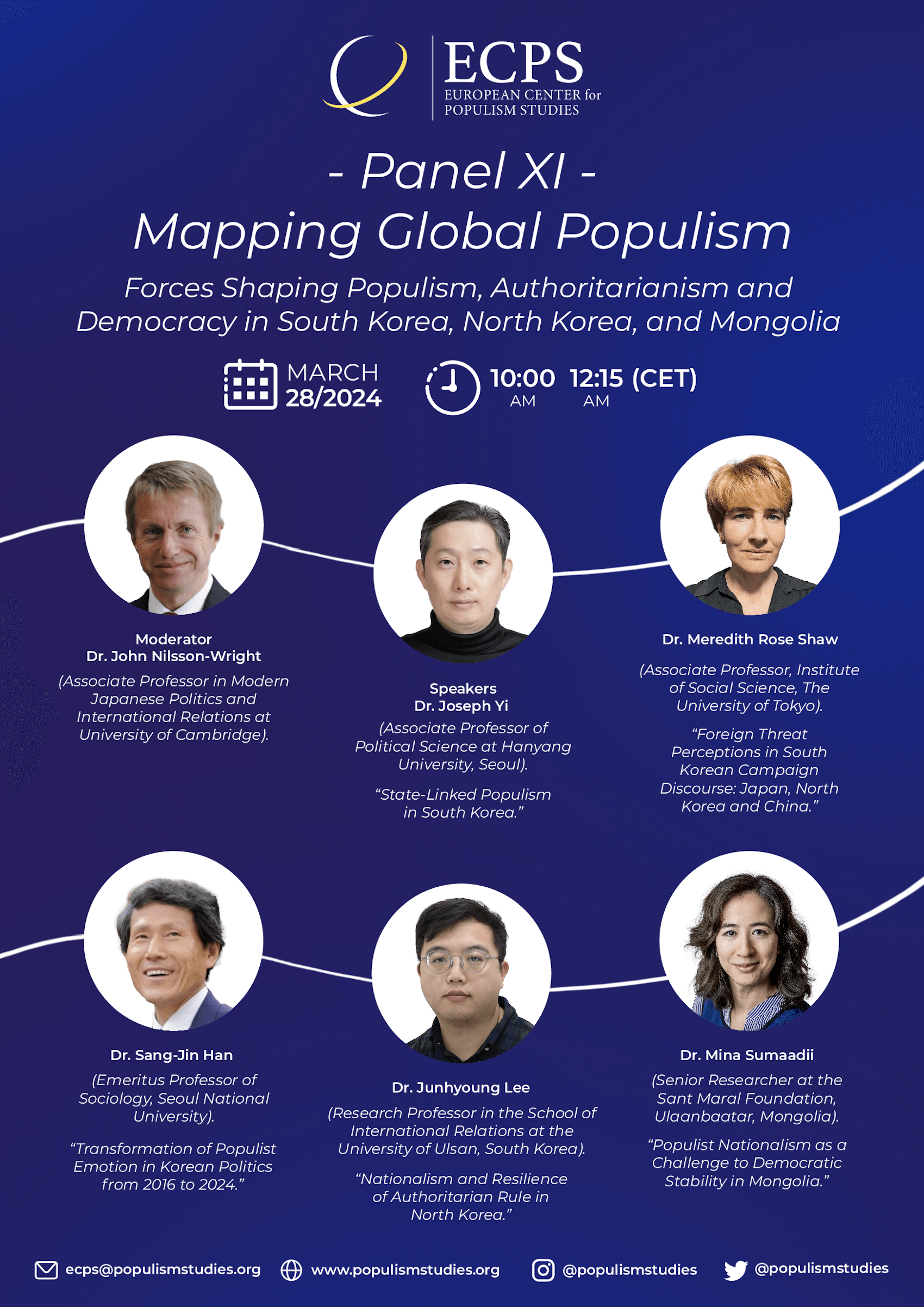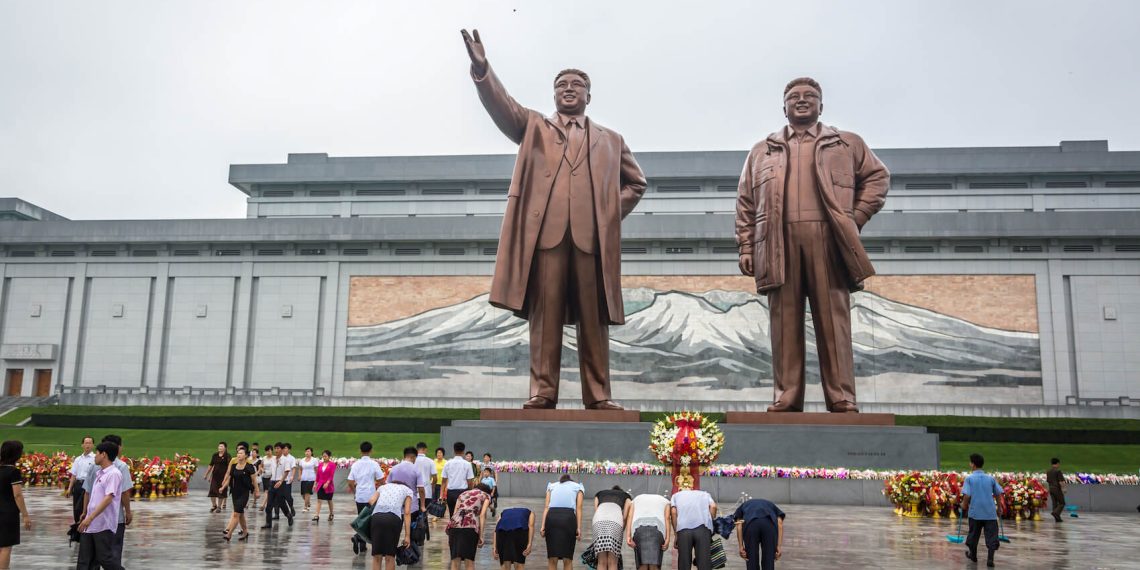Date/Time: Thursday, March 28, 2024 — 10:00-12:15 (CET)
Click here to register!
Moderator
Speakers
“Discourse Regimes and Liberal Vehemence,” by Dr. Joseph Yi (Associate Professor of Political Science at Hanyang University, Seoul).
“Foreign Threat Perceptions in South Korean Campaign Discourse: Japan, North Korea and China,” by Dr. Meredith Rose Shaw (Associate Professor, Institute of Social Science, The University of Tokyo).
“Transformation of Populist Emotion in Korean Politics from 2016 to 2024,” by Dr. Sang-Jin Han (Emeritus Professor of Sociology, Seoul National University).
“Nationalism and Resilience of Authoritarian Rule in North Korea,” by Dr. Junhyoung Lee (Research Professor in the School of International Relations at the University of Ulsan, South Korea).
“Populist Nationalism as a Challenge to Democratic Stability in Mongolia,” by Dr. Mina Sumaadii (Senior Researcher at the Sant Maral Foundation, Ulaanbaatar, Mongolia).
Click here to register!

Brief Biographies and Abstracts
Dr. John Nilsson-Wright is an Associate Professor in Modern Japanese Politics and International Relations at Faculty of Asian and Middle Eastern Studies, University of Cambridge. In addition to his positions at Cambridge, Dr Nilsson-Wright has also been Senior Research Fellow for Northeast Asia and Korea Foundation Fellow at the Asia Programme at Chatham House which he previously directed as Head of Programme from March 2014 to October 2016. He has been a Monbusho research fellow at Kyoto and Tokyo universities, and a visiting fellow at Tohoku University, Yonsei University, Korea University, and Seoul National University. He has also been a member of the World Economic Forum (WEF) Global Agenda Council (GAC) on Korea, the UK-Korea Forum for the Future, and he is a director of the UK-Japan 21st Century Group. In 2014 he was a recipient of the Nakasone Yasuhiro Prize. Dr. Nilsson-Wright’s recent work has continued to concentrate on the Cold War relationship between the United States and Northeast Asia, with particular reference to the security and political relationships between the United States and Japan and the two Koreas but has expanded to include contemporary regional security issues and political change.
Discourse Regimes and Liberal Vehemence
Dr. Joseph Yi is an Associate Professor of Political Science at Hanyang University in Seoul. He earned his B.A. from U.C. Berkeley and his Ph.D. in political science from the University of Chicago. Dr. Yi’s research focuses on diversity, civil society, and liberal democracy, particularly in North America and East Asia. In 2016, he was selected as one of the top 23 "Excellent Researchers" at Hanyang University, one of only two professors from the Social Sciences.
Foreign Threat Perceptions in South Korean Campaign Discourse: Japan, North Korea and China
Dr. Meredith Shaw is an Associate Professor in the Institute of Social Science at the University of Tokyo and the managing editor of Social Science Japan Journal. Her work, which has been supported by grants from the Fulbright Foundation and the Korea Foundation, examines cultural politics and state efforts to manipulate culture in East Asia. Her research has been published in Journal of Conflict Resolution, The Pacific Review, and Journal of East Asian Studies, and she has also written for The National Interest, Global Asia and The Diplomat. Dr. Shaw worked for several years as a research assistant and translator at the Korea Institute for National Unification before obtaining a Ph.D. in Political Science and International Relations from University of Southern California. She was a 2019 Korea-US NextGen Scholar and is in the inaugural cohort of the Mansfield-Luce Asia Scholars Network. Since 2017, she has maintained the North Korean Literature in English blog project (http://dprklit.blogspot.com/).
Abstract: Anti-China sentiment is on the rise in South Korea. Several recent polls have shown China for the first-time surpassing both Japan and North Korea as South Koreans’ most disliked neighbor, a trend that appears particularly strong among young people, exacerbated by Covid-19 and a backlash against Chinese migrants. This trend has potential to disrupt the equilibrium partisan divide on foreign policy which had previously been roughly balanced between anti-Japan left and anti-North Korea right.
If China policy becomes a mobilizing issue for South Korean voters, one might expect such sentiments to tip the balance toward right-wing populists, simply expanding on existing threat perceptions of communism and North Korea. But upon closer inspection, South Korean “China threat” rhetoric seems to borrow more from the classic anti-Japan rhetoric of the far left, portraying a great power bully that distorts history and appropriates Korean culture, rather than the anti-communist, human rights-centric imagery used by the far right against North Korea.
Through a discourse analysis of recent anti-China rhetoric in the legislature and on social media, I will examine how the “China threat” discourse is evolving in unique and unanticipated ways within the South Korean context.
Transformation of Populist Emotion in Korean Politics from 2016 to 2024
Nationalism and Resilience of Authoritarian Rule in North Korea
Dr. Junhyoung Lee a research professor in the School of International Relations at the University of Ulsan, specializes in comparative authoritarianism, North Korean politics, and post-communist regimes in East Asia. He earned his Ph.D. from University College Dublin (UCD). X: @leejunhyoung.
Abtsract: In the context of North Korea, nationalism serves as a pivotal instrument for the regime’s survival, intertwining ideological control with authoritarian resilience. This presentation examines the North Korean regime’s historical construction of nationalism, melding familial lineage with national narratives as a mechanism for consolidating power. It scrutinizes the interplay between nationalism and the durability of authoritarian governance in North Korea, drawing upon unstructured data from the Korean Central News Agency (KCNA) regarding nationalistic rhetoric and the higher rank politburo visit of sites emblematic of nationalism. The accentuation of nationalism has notably intensified in frequency, especially under the Kim Jong Un’s rule in 2011. Nevertheless, from a proportional perspective, this emphasis forms part of a multifaceted strategy of legitimacy, intertwining nationalistic rhetoric with assertions of economic prowess to underscore the regime’s resilience. It is at this critical intersection that the constraints of nationalism become apparent, particularly in bolstering the resilience of authoritarian governance in the absence of economic fulfilment. This presentation offers insights into the complexities of authoritarian resilience and the function of nationalism in contemporary North Korean society.
Populist Nationalism as a Challenge to Democratic Stability in Mongolia
Dr. Mina Sumaadii is a Postdoctoral Fellow at the School of International Studies, Sichuan University. She is also a Senior Researcher at the Sant Maral Foundation (SMF), one of the leading polling institutions in Mongolia. During her time at the foundation, she worked on numerous national and cross-national surveys, including Gallup World Poll and World Justice Project. Her major research interests are in democratization, Chinese and Russian foreign policies, research methods, and international development.
Abstract: After Mongolia started its democratic transition, the transitional recession lasted throughout the 1990s. Then in the 2000s the government started to develop its resources sector and chose mining based economic development. By 2010s this has brought unprecedented wealth with a variety of foreign investors. Nonetheless, as quickly as the wealth appeared, it plummeted. Analysts link it to weak institutions of control and an underdeveloped legal framework. These shortcomings were linked to some of the biggest allegations of corruption and related scandals in the next decade. At the same time some of the politicians resorted to populism as an electoral strategy. This study addresses two types of populism found in Mongolia – populist nationalism and populist resource nationalism.


